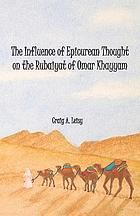Omar Khayyam’s Epicureanism: The Spanish Translations of Rubaiyats (1904-1930). A. Gasquet.
In: Peripheral Transmodernities: South-to-South Intercultural Dialogues between the Luso-Hispanic World and ‘the Orient’. Ed. by Ignacio López-Calvo. Newcastle upon Tyne, Cambridge Scholars, 2012. pp. 155-177. ISBN 9781443837149.
The author gives a brief summary of a number of translations published in Spanish-American countries. Here, and in the Phillipines twelve translations of the Rubáiyát were issued in twenty-six years. The first translation was by Juan Dublan (Mexico, 1904), followed by Gregorio Martinez Sierra (Madrid, 1907), and finally by Francisco Propata (Paris, 1930). Four works are discussed more in detail: the versions by Dublan, Muzzio Sáenz-Peña, González and Bernabé. Gasquet describes the socio-cultural conditions of their time, and the sources of their work. He also shows how the hedonist-mystic debate played a role in these works.
